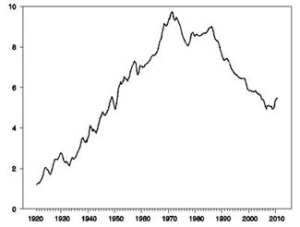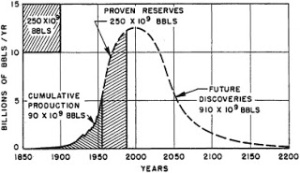In today’s installment of our Holiday Smorgasbord, I bring you two voices that I have been following off and on for the last decade, and who have both been warning about limits to growth, and more importantly what we as individuals can do about it.
Nate Hagens on Limits to Growth: Where We Are and What to Do About It
Nate Hagens, a former “wolf of Wall Street” stock trader/money manager, and then a popular writer (for a long time under the ‘Sasquatch’ nom de plume) at The Oil Drum website. Here is his presentation at the recent Degrowth conference in Vancouver, B.C. It’s long – an hour and a half, but worth watching. Hagens talks about the big picture of energy, money, environment, behavior (how neurotransmitters and hormones motivate our behavior), where we are in 2014, and some take-aways on what we can do in our own lives. Along the way he shares his own story – and how he’s never been happier. Interestingly at this “Degrowth” conference, Hagens makes it clear that he’s not advocating for degrowth – rather he thinks the end of growth is a reality, and we have to deal with it. His top-level recommendation is to “embrace life.” Nate Hagens – Limits to Growth: Where We Are and What to Do About It
Facts, Values, and Dark Beer
Another memorable post by John Michael Greer, wide ranging and addressing some deep questions, such as the meaning of life, especially in the context of a difficult future:
Claiming that one such sphere is the only thing that makes human life worthwhile is an error of the same kind. If Ervino feels that scientific and technological progress is the only thing that makes his own personal life worth living, that’s his call, and presumably he has reasons for it. If he tries to say that that’s true for me, he’s wrong—there are plenty of things that make my life worth living—and if he’s trying to make the same claim for every human being who will ever live, that strikes me as a profoundly impoverished view of the richness of human possibility. Insisting that scientific and technological progress are the only acts of human beings that differentiate their existence from that of a plant isn’t much better. Dante’s Divina Commedia, to cite the obvious example, is neither a scientific paper nor a technological invention; does that mean that it belongs in the same category as the noise made by hogs grunting in the mud?
…As for me—well, all things considered, I find that being alive beats the stuffing out of the alternative, and that’s true even though I live in a troubled age in which scientific and technological progress show every sign of grinding to a halt in the near future, and in which warfare, injustice, famine, pestilence, and the collapse of widely held beliefs are matters of common experience. The notion that life has to justify itself to me seems, if I may be frank, faintly silly, and so does the comparable claim that I have to justify my existence to it, or to anyone else. Here I am; I did not make the world; quite the contrary, the world made me, and put me in the irreducibly personal situation in which I find myself. Given that I’m here, where and when I happen to be, there are any number of things that I can choose to do, or not do; and it so happens that one of the things I choose to do is to prepare, and help others prepare, for the long decline of industrial civilization and the coming of the dark age that will follow it.

